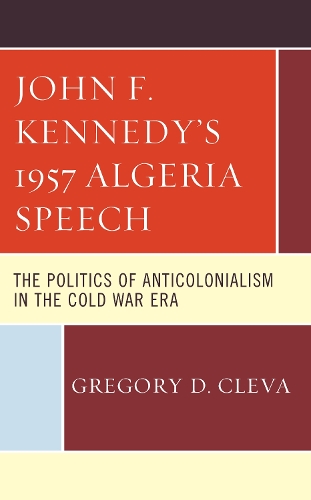
John F. Kennedy's 1957 Algeria Speech: The Politics of Anticolonialism in the Cold War Era
(Hardback)
Publishing Details
John F. Kennedy's 1957 Algeria Speech: The Politics of Anticolonialism in the Cold War Era
By (Author) Gregory D. Cleva
Bloomsbury Publishing PLC
Lexington Books/Fortress Academic
4th March 2022
United States
Classifications
Professional and Scholarly
Non Fiction
History
International relations
973.922092
Physical Properties
Hardback
284
Width 161mm, Height 227mm, Spine 28mm
594g
Description
John F. Kennedy remains a compelling figure almost sixty years after his tragic assassination. Kennedys voicewith all of its characteristic eloquenceas well as the engaging complexity of the man himself, are brought to life in John F. Kennedys 1957 Algeria Speech. This book deals with one of Kennedys most important as a U.S. Senatorbut least recognizedforeign policy speeches calling for Algerian independence after more than a century of French colonial rule. The reader will experience the debate surrounding Kennedys speech of July 2, 1957, particularly the resistance it encountered from the Eisenhower administration, French officials, and French citizens, senior members of Americas foreign policy community such as Dean Acheson and Adlai Stevenson, and editorial criticism in some of the most distinguished journals in the United States and France. The author offers new insights into Kennedys reasons for giving this speech, as well as his extensive preparation spanning fifteen months. Cleva uses in depth scholarship to analyze several years of classified U.S. Government documents dealing with the Algerian crisis in order to provide this comprehensive study of Kennedys Senate speech, how it shaped Kennedys own administration, as well its significance to American foreign policy.
Reviews
An extraordinarily authoritative and lucid exposition about JFK's most ambitious and risky pre-Presidential venture to break new ground on the subject of American power and the African anti-colonial revolution.
-- Richard Mahoney, North Carolina State UniversitySenator John F. Kennedys 1957 speech on Algeria, highly controversial at the time, has been largely overlooked since his presidency. Clevas careful evaluation of the speech and its Cold War context shows that Kennedy, six years before the American University speech of 1963, was already thinking in terms of viable alternatives to US policies on colonialism and the Cold War, policies that the US foreign policy establishment was convinced (erroneously) that it had no choice but to follow.
-- John W. Langdon, co-author, The Struggle Against Imperialism: Anti-Colonialism and the Cold WarIn John F. Kennedy's 1957 Algeria Speech, Cleva provides a meticulously researched account of a moment when the young senator firmly established his foreign policy credentials in a speech that offered an escape from the constraints of Cold War dogma. Cleva notes the significance of the speech for Kennedy's political ambitions, of course, but he gives the reader much more by carefully situating it in its global context. As a result, this is an important study for those seeking to understand what sets Kennedy apart in the post-World War II history of U.S. foreign policy.
-- Robert E. Williams Jr., Pepperdine UniversityAuthor Bio
Dr. Gregory Cleva is lecturer in American foreign policy at the George Mason University/Osher Life-long Learning Institute
